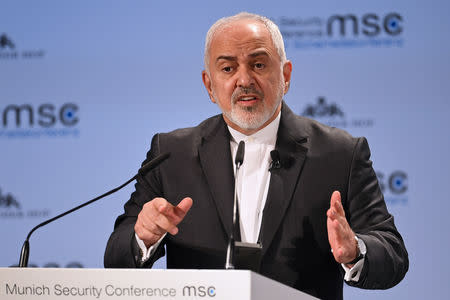Pressure over Iran nuclear deal forced Zarif to resign: ally

By Parisa Hafezi and Babak Dehghanpisheh
DUBAI/GENEVA (Reuters) - Pressure from hardliners over Iran's nuclear deal with world powers forced Foreign Minister Mohammad Javad Zarif to resign, an ally said on Tuesday.
Zarif - the U.S.-educated architect of the 2015 pact which curbed Iran's nuclear programme in exchange for sanctions relief - gave no reason when he announced his decision on Monday, news which sent Iranian stocks lower.
"There were closed-door meetings every week, where top officials were bombarding him with questions about the deal and what will happen next and so on," the ally told Reuters on condition of anonymity.
"He and his boss (President Hassan Rouhani) were under huge amount of pressure," the ally added.
Anti-Western factions in Iran criticised Rouhani and Zarif after the United States pulled out of the nuclear agreement last May and reimposed sanctions on Iran's economy and its lifeblood oil industry that were lifted under the deal.
Rouhani - a champion of the nuclear deal - has still not formally accepted Zarif's resignation. And the majority of lawmakers sent Rouhani a letter asking him to keep Zarif on, the Islamic Republic News Agency (IRNA) reported.
Rouhani has not responded publicly to the letter from lawmakers, but piled praise on Zarif on Tuesday, saying the minister had been at the forefront of the fight against America, IRNA said.
Unconfirmed media reports indicated Zarif resigned because he had not been informed about Syrian President Bashar al Assad's visit to Tehran on Monday.
In another apparent olive branch, Rouhani said Assad had specifically thanked Iran's foreign ministry during his visit.
Zarif was quoted as condemning "factional fighting" in a newspaper interview published on Tuesday - suggesting political tensions may have played a part in his decision.
The Fars news agency reported that the interview had taken place last week, before Zarif's resignation.
(Reporting By Babak Dehghanpisheh; editing by Michael Georgy and Andrew Heavens)

